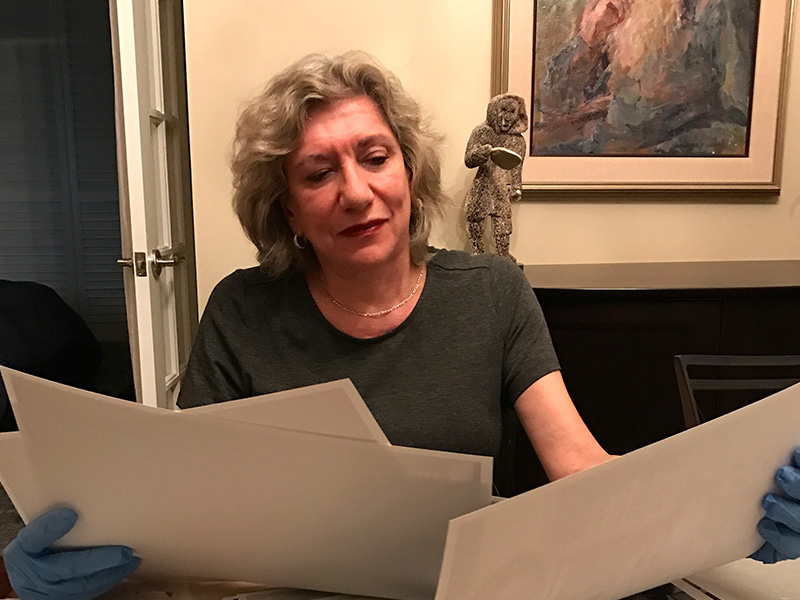Irene Borins Ash’s living room is full of art. The walls are adorned with paintings, tapestries and photographs, and her wall units display ceramics and Inuit sculptures. It’s a fitting room for an artist.
Borins Ash, who is also a social worker, wears several hats: she’s an accomplished tapestry artist, photographer, author and now, a documentary filmmaker.
She launched her first film One Planet: Harnessing Hope, on YouTube in March. The documentary, an ecumenical perspective on fighting climate change, can easily be accessed on her website, ireneborinsash.com.
Borins Ash interviewed leaders from a number of different religious groups in order to demonstrate that many people of diverse faiths are united in the fight against climate change.
In addition to the documentary film, One Planet is also the name of an exhibition of about 30 of her black-and-white photographs.
On this day, Ash has donned blue gloves to examine a pile of newly developed black-and-white photographs of the people who appear in her documentary film. These stills will be exhibited in the Rotunda at Toronto City Hall in 2018.
READ: CANADIAN AMONG GROUP THAT KEPT COMIC BOOKS ALIVE
Borins Ash’s photography is also prevalent in her two books: Treasured Legacies: Older and Still Great and Aging is Living.
She said that before she moved to a condo, she had “an awesome garden” on Spadina Road. About nine years ago, she noticed the plants were budding in February.
“I knew this wasn’t right. I realized nothing else mattered but the environment,” she said. “I said to myself that for the rest of my life, I have to be devoted to the environment.”
Borins Ash said the late Lubavitcher Rebbe, Rabbi Menachem Mendel Schneerson, had a tremendous impact on her thinking.
She called him an early environmentalist: “The rebbe was a scientist at the Sorbonne (University in Paris). He understood before some of the scientists that if we don’t do something about the environment, it would be catastrophic.”
She pointed out that the rebbe attracted people of all faiths to his lectures: “He inspired me to focus on environmentalism from a multifaith perspective.”
Faith & the Common Good: Greening Sacred Spaces, a national interfaith network committed to environmental issues, was a partner in the One Planet project. Also very involved was Borins Ash’s husband, Irv Ash, a lawyer and Seneca College law professor.
The couple travelled to New York City in 2014 to document the People’s Climate March. Borins Ash served as an official photographer for GreenFaith: Interfaith Partners for the Environment, the New Jersey-based organization that was one of the key organizers of the march, which drew an estimated 300,000 people.
One of the people Borins Ash met was Toronto native, Rabbi Lawrence Troster.
“At the time I took his photo, he was the rabbinic scholar in residence for GreenFaith,” she said, adding that the rabbi is devoted to educating the next generation about the importance of environmental stewardship.
In New York, Borins Ash also met Rev. Gerald Durley, a psychologist and pastor in Atlanta who heads Interfaith Power & Light, an organization dedicated to international environmental issues.
Through her work, Borins Ash said she has developed close ties with Shoresh, a Toronto-based Jewish organization dedicated to environmental sustainability.
She also connected with Shari Goldberg, co-founder of Shema & Iqra, a Jewish and Islamic group engaged in studying texts related to the environment, and Rev. Bill Phipps, a former moderator of the United Church of Canada and the founder of Faith and the Common Good.
Borins Ash has profiled many other faith groups dedicated to environmental sustainability, among them, the Creation Care Network, an environmental council within the Canadian Mennonite Church and Khaleafa, an Islamic environmental organization.







